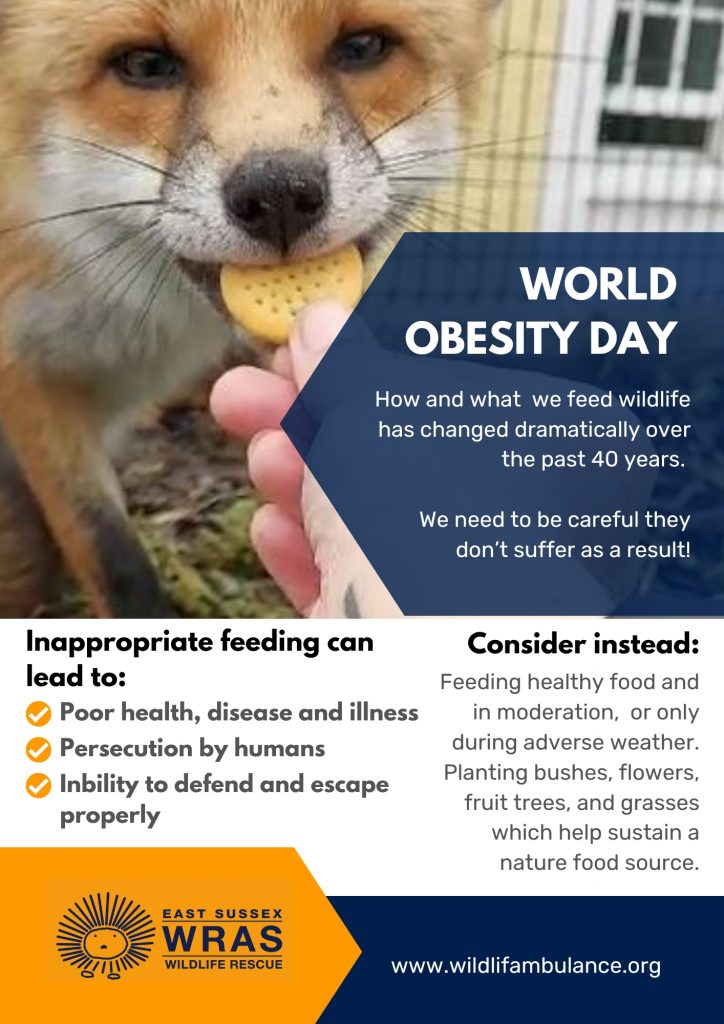
Its World Obesity Day. Did you know that we are starting to see problems with overweight and obese wildlife?
Today we are asking people to take a step back and think about the need to feed wildlife, and when it is necessary, to think about is it being done in a sustainable and healthy way.
East Sussex WRAS has seen huge badgers, foxes, hedgehogs, and even witnessed birds struggling to fly as a result of trying to eat too much. Even admitting a hedgehog which weighed over 1.5kg!
East Sussex WRAS Vet Clarissa Wu said “Feeding wildlife an inappropriate diet of human/ fatty food can cause serious health problems, e.g. cardiovascular compromise and fatty liver degeneration. Obesity in hedgehogs can also interferes with their ability to curl up tightly which puts individuals at increased risk of predation.”
WRAS volunteer Lyn Snowdon has witnessed people feeding chips to birds on Eastbourne seafront, “although it may seem enjoyable, this behaviour is not particularly healthy. Moreover, it attracts birds to swoop down and dive-bomb humans, resulting in conflicts and potential injuries”.
WRAS rescuer Ollie Long said “I've noticed individuals feeding crisps to ducks, pigeons, crows, and swans at local parks. This is not a nutritious diet and could result in vitamin deficiencies if they do not consume a well-balanced diet.”
Wild animals and birds have a different approach to food compared to humans. Despite people's good intentions to help local wildlife by providing food, the animals do not perceive this as a commitment. Typically, they will consume as much food as possible each time to prepare for potential scarcity elsewhere. This behaviour can sometimes be misinterpreted as hunger or starvation, when in reality, the animals are just being cautious and stocking up on food. People often project human emotions onto wildlife, leading to an assumption of starvation and an increase in food provision. Consequently, this results in a rise in the local wildlife population and competition among the animals. This creates a cycle where more food is provided as more animals arrive, mistakenly perceived as desperate for sustenance. Gradually, what started as feeding a single animal or bird escalates into feeding dozens, contributing to an overpopulation issue in the local area.
“Excessive feeding leads to conflicts between humans and wildlife, resulting in wildlife bearing the unfortunate consequences. Those who live close to those encouraging over population, take matters into their own hands. Taking out their frustrated with the noise, faeces or damage on the wild animal or bird involved. We are often presented with cases of wildlife being either poison, injured by people using guns, catapults or cross bows, and even by people setting their dogs on wildlife sadly.” explained Trevor Weeks MBE WRAS’s founder.
East Sussex WRAS recommends feeding wildlife in moderation and suggests promoting natural feeding habits by planting flowers, vegetables, bushes, shrubs, trees, and grasses. This approach can offer a diverse range of natural food sources for wildlife.
“Seeing wildlife in our gardens is a great way of improving our mental health and a great educational tool to teach children tolerate and compassion. This can still be done in a safe way by encouraging the presence of smaller bugs and beetles, as well as planting fruits and seeds, supports the foundation of the food chain. This, in turn, sustains a healthy ecosystem by providing food for predators at all levels without leading to overpopulation, thus safeguarding our valuable wildlife.” said Trevor.
The charity is also advising against hand feeding or attracting wildlife right up close to or even inside homes to prevent possible harm from those who are not wildlife-friendly.
Share this!